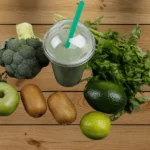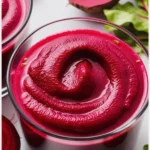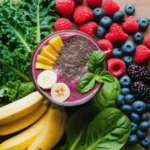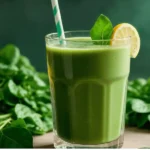Storing fresh juice might seem tricky, but with the proper steps, keeping it fresher, tastier, and vitamin-packed is easy. While the ideal way is to consume the juice immediately after making it, a busy schedule, commitments, or travel can complicate this.
Preparing ahead of time and learning to store it properly—in the fridge or freezer—prevents spoiled, wasted produce and lost nutrients, making regular consumption more attainable.
Whether working on large batches for a few days or ensuring freshly made juice stays perfect, planning is a true saver.
Cold Pressed Juice Storage Tips
Keep cold-pressed juice fresh by storing it in airtight glass containers at 35-40°F (1.6-4.4°C) and consuming it within 72 hours for best quality.
1. Choose a Cold-Press Juicer
The first step to adequately storing fresh juice is choosing the right juicer. Like Hurom’s models, a cold-press juicer is the best option for keeping your juice tasty and fresh for longer.
These juicers generate minimal heat and oxidation, which helps the juice retain more nutrients and remain stable. They gently extract juice while preserving essential vitamins, enzymes, and minerals that can degrade faster when exposed to heat or air.
By choosing a cold-press juicer, you start with a nutrient-rich and stable base, making it easier to enjoy the benefits of fresh juice for days.
2. Store Juice in Airtight Glass Containers
Store your cold-pressed juice in airtight, clean glass jars to keep it fresh and full of nutrients. These jars are non-reactive so they won’t affect the taste or composition of the juice.
When juicing fruits and veggies, the process breaks the cell walls, exposing the juice’s nutrients to heat, air, light, and oxygen, which can speed up nutrient loss. Containers with tightly sealed lids limit this exposure and help the juice stay fresh longer.
Avoid loose-fitting lids, as air can enter, causing the juice to spoil faster. This simple tip ensures your juice retains its natural flavors and goodness for as long as possible!
3. Keep Juice in the Fridge at 35-40°F (1.6-4.4°C)
To keep your cold-pressed juice fresh and packed with nutrients, always store it in the fridge at a temperature between 35 and 40°F (1.6 to 4.4°C). This temperature slows nutrient degradation and prevents bacteria growth, ensuring your juice lasts longer.
If you’re traveling or don’t have space in your fridge, a cooler bag with ice packs works well to maintain freshness. For an insider tip, place the juice at the back of the refrigerator, where the temperature is most consistent, to extend its shelf life even more.
4. Fill Containers to The Top
Always fill your containers to the brim when storing cold-pressed juice. Leaving extra air space allows more oxygen exposure, which speeds up the oxidation process and can affect the quality of your fruit and vegetable juices.
By reducing the air, you help keep the juice fresh and slow changes in flavor or color. This simple step keeps the juice looking appealing and preserves its natural taste and vital nutrients for longer.
5. Add Lemon Juice
Using lemon juice is a simple way to keep your cold-press juice fresher for longer. Adding a small amount works as a natural preservative because the citric acid in lemons is an antioxidant. It slows the breakdown of essential vitamins, prevents browning, and delays oxidation.
This is especially useful when juicing fruits like apples or peaches, which tend to oxidize quickly. For comparison, citrus juice or grape juice naturally lasts longer. Here’s an insider tip: adding lemon juice is a quick, effective way to protect your juice’s flavor and nutrients.
6. Freeze Juice in Portions
Freezing is an excellent option if you need to store fresh juice for an extended period. It slows the oxidation process and helps preserve nutrients.
For convenience, freeze the juice in small portions using small glass containers to defrost just what you need quickly.
Here’s an insider tip: leave a little room at the top of the container, as the juice will expand when it freezes. While frozen juice can last for weeks, consuming it within 2-3 months is best for the best flavor and nutrition.
7. Drink Within 72 Hours
Drink your juice fresh to keep its taste and retain maximum nutrition. Enjoying it within 72 hours is crucial for the best benefits, especially if you’re not planning on freezing it.
Freshly-made juices can quickly lose nutrients when exposed to air, so drinking them sooner ensures you enjoy the better flavors and full nutritional value. Adopting proper storage techniques like airtight containers can help slow the process of nutrient loss. Still, even with careful methods, the best taste comes during the first three days.
If left longer than 72 hours, the cold-press juice may degrade, impacting its taste and the health perks derived from the fruits and vegetables you’ve juiced. When exploring new COLD PRESSED JUICE RECIPES, always store your creations properly for the freshest flavors.
What To Look for When Juice Spoils
To know if your cold-pressed juice has spoiled, check for warning signs like oxidation, separation with brown foam, pulp sedimentation, grayish or dull color changes, strong fermented smells, or mold development.
While pulp separation is natural in fresh juice, these changes mean tossing the remains is time. The nutrient content is denatured, and trying to shake, blend, or fix oxidation issues for taste or visual factors won’t restore safety or nutrition. Enjoy the vibrant qualities of fresh juices within their fridge shelf life.
Conclusion
In conclusion, Properly storing cold-pressed juice ensures you can enjoy its taste, nutrition, and vibrant qualities for longer. By following practical steps like using a cold-press juicer, storing juice in airtight glass containers, maintaining the right temperature, and incorporating small techniques like adding lemon juice or freezing in portions, you can significantly extend the freshness of your juice.
Always drink your juice within 72 hours for maximum benefits, and consider warning signs like oxidation or mold development to ensure safety. With some planning and care, you can enjoy fresh, nutrient-packed juices with rich flavors and health benefits daily.
FAQ’s
Q: How to increase the shelf life of cold-pressed juice?
To increase the shelf life of your juice, always use the freshest fruits and vegetables, store it in an airtight container, and place it in the refrigerator immediately after pressing. This helps slow the oxidation process and prevents bacterial growth, ensuring your juice stays fresh longer.
Q: Can cold-pressed juice be unrefrigerated?
To ensure cold-pressed juices remain safe to consume, they should not be left at room temperature for more than two hours. Suppose the temperature is above 90° F. In that case, these perishable foods must be refrigerated within one hour to avoid becoming unsafe.
Q: What is a natural preservative for juice?
To preserve juice naturally, use ascorbic acid (vitamin C), citric acid, malic acid, or honey to retain color and prevent browning. A splash of fresh juice, essential oil, or alpha-tocopherol (vitamin E) can help preserve the flavor and maintain freshness.
Q: How can you determine if cold-pressed juice has spoiled?
Look for changes in color, texture, smell, and taste, as these can signal that your juice is no longer fresh and should be discarded. Signs like a chunky or slimy consistency often indicate oxidation and spoilage.







